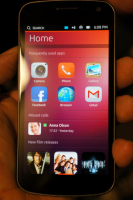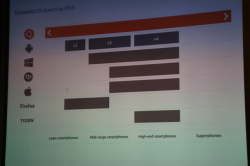Canonical phones in Ubuntu for phones

![]() Mark Shuttleworth presented the project that his company has kept under wraps and under development for over two years
Mark Shuttleworth presented the project that his company has kept under wraps and under development for over two years
Canonical has announced an Ubuntu for phones, finally revealing a project which has been under development for over two years and that has had an ongoing influence on the design and development of Ubuntu. The announcement comes in the week before the phone operating system will be shown at CES in Las Vegas from 8 to 11 January; Canonical will probably be looking for manufacturers and carriers prepared to sign up for the currently incomplete mobile offering.
Technically, the operating system has an Ubuntu core and a custom environment, designed for phones, wrapping the smartphone functionality. The kernel is configured to be able to use Linux/Android BSP drivers, which should make it easier for any hardware vendor wishing to use the OS to integrate it with their hardware. For now, Canonical has targeted the discontinued Google/Samsung Galaxy Nexus as a reference device.
The user interface makes heavy use of edge swipes; a swipe from the left edge brings up an application launcher, a swipe from the right acts as an "previous application" operation, a swipe down brings up status and notification information, and a swipe up displays buttons for the current application. Applications themselves can be either web apps in HTML5 or native Qt/C/C++ and Qt Markup Language (QML) with JavaScript; a developer toolkit for native apps is being made available. Web applications use the same Canonical API previewed in Ubuntu 12.10 to integrate with the operating system and notification system. Canonical says that existing web integrations for Facebook, Twitter, Google Maps, Gmail, and Spotify already work on the platform. A video presentation by Shuttleworth was also available to give a tour of the features which starts at 5:25 into the video:
Shuttleworth's video presentation of Ubuntu for phones
The system currently lacks a lock screen but comes with a "welcome screen" that displays information relevant to the user such as emails waiting, tweets received and similar; that information is also fed into the image generator in the welcome screen which creates an image of a circle surrounded by other circles fading in; this imagery was actually used for the company's countdown to the announcement.
The company says that the phone and welcome screen is not the only interface for the device and, in a similar fashion to Ubuntu for Android, when appropriately docked, Ubuntu for phones would display a desktop Ubuntu interface. That capability was not demonstrated though. Canonical believes that, in the future, developers should be able to write applications which can work across all four "screens" that they are designing for: the phone, the tablet, the desktop, and the TV. Canonical has yet to announce what it has planned for a tablet offering, but the phone announcement probably offers a strong indication. What is not planned, says Shuttleworth, is any support for Android applications on the Ubuntu platform, but he notes the platform will be open enough for third parties to implement Android emulation applications on the device.

![]() Trying out the demonstration version of Ubuntu for phones at the launch
The demonstration phones available at the launch were somewhat limited in their capabilities. Although Shuttleworth was able to demonstrate making a call on his own Galaxy Nexus running Ubuntu, the demonstration lacked a number of applications which were substituted with still images, and the media player was only capable of playing back video. One feature, for example, the voice controlled HUD which was shown in the presentation as a way to quickly access application features, was not available to demonstrate in any form.
Trying out the demonstration version of Ubuntu for phones at the launch
The demonstration phones available at the launch were somewhat limited in their capabilities. Although Shuttleworth was able to demonstrate making a call on his own Galaxy Nexus running Ubuntu, the demonstration lacked a number of applications which were substituted with still images, and the media player was only capable of playing back video. One feature, for example, the voice controlled HUD which was shown in the presentation as a way to quickly access application features, was not available to demonstrate in any form.
In the coming weeks it should become clearer what functionality has been implemented though as Canonical plan to release images for installation on the Galaxy Nexus phone for people to experience. Users should also be able to see how battery life and other essential features for a phone are handled; when asked about battery life, Shuttleworth would only say that the device had no problems idling overnight. One of the aims of the recent release of a port of Ubuntu for the Nexus 7 tablet was to help the developers optimise the operating system to consume minimal power; as well as making it more battery friendly on mobile devices, Shuttleworth says it helps with Ubuntu in the cloud, making it more economical to run.

![]() Shuttleworth says Ubuntu can address all phone sectors, including the as yet to be realised "Superphone" sector.
Shuttleworth says that he hopes to ship, on a device, a finished Ubuntu for phones system by the end of 2013 or early 2014. Before then though, Canonical hopes to have shipped Ubuntu for Android, the smartphone offering that it announced in February 2012; this allowed an Ubuntu desktop to be launched from an Android phone without replacing the Android underpinnings. When asked why there had been no release of the code for Ubuntu for Android to date, Shuttleworth explained that it required modifications to the underlying Android OS, almost practically rooting it, and therefore couldn't be distributed without the co-operation and modified firmware of a vendor. Canonical could make a release using the already modifiable CyanogenMod Android ROMs; Shuttleworth said he would consider the idea.
Shuttleworth says Ubuntu can address all phone sectors, including the as yet to be realised "Superphone" sector.
Shuttleworth says that he hopes to ship, on a device, a finished Ubuntu for phones system by the end of 2013 or early 2014. Before then though, Canonical hopes to have shipped Ubuntu for Android, the smartphone offering that it announced in February 2012; this allowed an Ubuntu desktop to be launched from an Android phone without replacing the Android underpinnings. When asked why there had been no release of the code for Ubuntu for Android to date, Shuttleworth explained that it required modifications to the underlying Android OS, almost practically rooting it, and therefore couldn't be distributed without the co-operation and modified firmware of a vendor. Canonical could make a release using the already modifiable CyanogenMod Android ROMs; Shuttleworth said he would consider the idea.
Ubuntu for phones has already had a major influence on the development of Ubuntu on the desktop. Much of the design work on fonts and colour schemes and the code development around notifications and web applications has leaked back into the Ubuntu desktop project and helps explain many of the design decisions taken by the company. Canonical now though has to deliver the phone operating system to the market, one that is increasingly crowded with Android dominating, Tizen being prepped by Samsung and others, Jolla pushing out their Mer-Linux-based phone Sailfish OS, and Mozilla preparing Firefox OS for later this year.
(djwm)
![Kernel Log: Coming in 3.10 (Part 3) [--] Infrastructure](/imgs/43/1/0/4/2/6/7/2/comingin310_4_kicker-4977194bfb0de0d7.png)

![Kernel Log: Coming in 3.10 (Part 3) [--] Infrastructure](/imgs/43/1/0/4/2/3/2/3/comingin310_3_kicker-151cd7b9e9660f05.png)
















